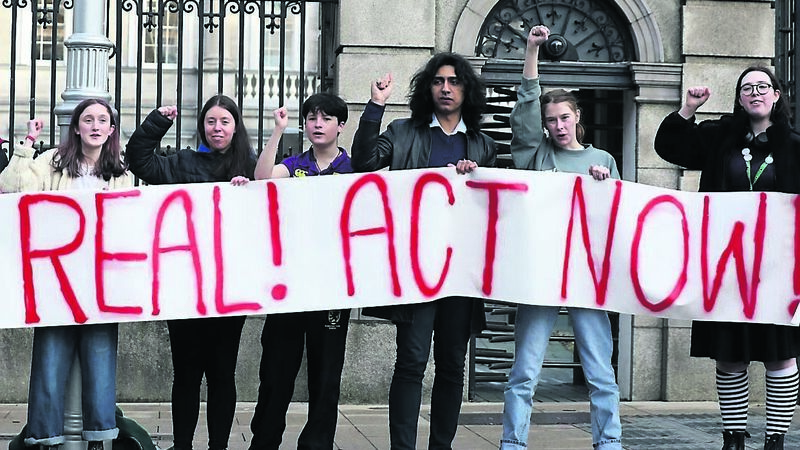Climate change despair... but the antidote is clear - action!

Fridays For Future Dublin holding a demonstration to protest the lack of action in relation to climate change at the Dáil in 2022.
There are so many things to be worried about and the world seems so chock-a-block with bad news that it is natural to look away, or scroll past another sad story.
This week’s column isn’t pretty. You might want to look away now. Turn the page and skip straight to the football results. It’s pessimism with punctuation. But then a dose of hope.
The latest report on the Intergovernmental Panel of Climate Change (IPCC), released last week, is another sad chapter in human history. It adds a pretty monumental dollop of worry onto the pile of the world’s worries.
The work of 700 scientists in 91 countries, it is the culmination of eight years of research and analysis. It is blunt. Humans are responsible for global warming, fossil fuels are driving that warming, and with existing policies we are on track to exceed 1.5C, 2C and reach around 3.2C by 2100.
That level of warming will mean large parts of the planet will be uninhabitable and many species, including many humans, won’t survive.
My daughter turned six last week so she is facing this future in her lifetime. So am I. I hope to live another 40 years at least, so potentially I will be an old lady watching these depressing predictions play out.
Millions of people around the world are already suffering the consequences of 1.2C of warming and are losing sleep and worrying about what summer 2023 will bring in terms of unbearable temperatures, or if rains will break the drought this year, or if they will escape floods this year.
The report says: “There is a rapidly closing window of opportunity to secure a liveable and sustainable future for all…The choices and actions implemented in this decade will have impacts now and for thousands of years.”
If we want to halt the climate crisis we need “rapid and deep and, in most cases, immediate greenhouse gas emissions reductions in all sectors this decade”, and that global GHG emissions must peak “between 2020 and at the latest before 2025” to keep warming below 1.5C or 2C.”
We have two years to turn the ship around.
Essentially, we need to cap fossil fuel use and scale the industry down until it doesn’t exist by the middle of the century. Instead, the world spends $1.8 trillion a year (I repeat, a year!) on practices that harm the planet - subsidies to fossil fuel firms, agriculture and other unsustainable practices.
The summary of the IPCC report is a more palatable distillation agreed by negotiation of UN countries of the main scientific findings. Oil and gas producing countries wanted to dial down some of the originally proposed language. It’s depressing to think of countries, horse trading words as if the physics of the atmosphere cares about the subtleties of language.
The IPCC report got press attention on the day of publication but quickly slid down the news agenda. Another day, another alarming climate report. Same old news, therefore no news?
On social media, some apathetically commented that “maybe it was too late” to do anything about climate change, with scientists retorting it will never be too late, in the same way it will never be too late to stop punching ourselves in the face.
I keep thinking how our ancestors of the future will look back at this ludicrous period of human history and say ‘What were they thinking? Why did they keep adding fuel to the fire? Why did they keep heating the pot they were living in?’
The ‘boiling frog analogy’ of a frog not noticing the temperature rising until it was well and truly cooked seems apt. Are we all frogs?
Clearly, politicians and businesses need to be held to account and there is a growing body of people who are working to do that.
My favourite expression to dispel climate anxiety is “the antidote to despair is action”. Around the world and in Ireland, you can see people protesting and taking drastic steps to highlight the issue and try and mobilise the masses to force politicians to move faster.
In the U.S, a climate movement called The Third Act is harnessing the protest power of the Baby Boomers, those aged over 55 entering the ‘third act’ of life, to bring about change. Last week they protested outside banks who continue to invest in fossil fuel projects.
The New York Times dubbed the protests A ‘Rocking Chair Rebellion’. Older climate activists held placards declaring ‘Fossils against fossil fuels’ and chopped up credit cards.
In Dublin, a ‘Women in Tech’ event organised by investment bank, JP Morgan, was disrupted by Irish climate activists from Extinction Rebellion arguing that JP Morgan, the world’s largest banking investor in fossil fuels, is perpetuating a practice that the IPCC explained is incompatible with liveable and survivable future for all.
In Canada, university students are on hunger strike to make their university, McMaster University, divest from fossil fuel investments.
These actions are important. Just like it takes one or two lone dancers to venture onto a dance floor first before the party dancing takes off, these kinds of climate protests are gaining momentum.
“If you don’t ask, you don’t get” said the great Mahatma Gandhi, a man who certainly knew how to bring about enormous change.







 App?
App?




